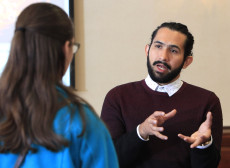Berkeley Lab Computing Sciences Inspires at National Science Bowl
May 4, 2016

Joaquin Correa gave a talk on high performance computing during the Science Day Program at the 2016 National Science Bowl competition. Photo by Dennis Brack, National Science Bowl, Department of Energy.
Last week, more than 9,000 of the nation’s brightest high school students and 4,500 middle school students convened in Washington, D.C. to compete in the Department of Energy’s (DOE’s) National Science Bowl. The four-day event, which ran from April 28 to May 2, overlapped with National Science Day, where researchers from national labs across the country talked to students about their work.
This year, three Berkeley Lab Computing Sciences staffers talked to students about research being conducted at two of DOE’s most productive user facilities:
- Joaquin Correa,a computer systems engineer at NERSC, gave a talk titled "From Detectors to High Performance Computing –Stories at NERSC.”
- Lauren Rotman, who heads ESnet’s Science Engagement Group, and Jason Zurawski, a science engagement engineer at ESnet, presented a talk titled “Of Mice & Elephants: Science Networks vs. the Internet."
The National Science Bowl is a nationwide academic competition that tests students’ knowledge in all areas of science and mathematics. Middle and high school student teams from diverse backgrounds are comprised of four students, one alternate, and a teacher who serves as an advisor and coach. These teams face-off in a fast-paced question-and-answer format, being tested on a range of science disciplines including biology, chemistry, Earth science, physics, energy, and math.
DOE created the National Science Bowl in 1991 to encourage students to excel in mathematics and science and to pursue careers in these fields. More than 250,000 students have participated in the National Science Bowl throughout its 25-year history, and it is one of the nation’s largest science competitions.
About Computing Sciences at Berkeley Lab
High performance computing plays a critical role in scientific discovery. Researchers increasingly rely on advances in computer science, mathematics, computational science, data science, and large-scale computing and networking to increase our understanding of ourselves, our planet, and our universe. Berkeley Lab’s Computing Sciences Area researches, develops, and deploys new foundations, tools, and technologies to meet these needs and to advance research across a broad range of scientific disciplines.







 Instagram
Instagram YouTube
YouTube